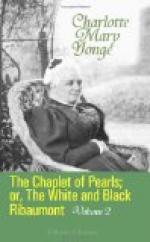Hitherto, her wandering life amid the persecuted Huguenots of the West had prevented her from hearing any preaching but good Isaac’s own, which had been rather in the way of comfort and encouragement than of controversy, but in this great gathering it was impossible that there should not be plenty of vehement polemical oratory, such as was sue to fly over that weary little head. After a specimen or two, the chances of the sermon being in Provencal, and the necessity of attending to her child, had been Eustacie’s excuse for usually offering to attend to the menage, and set her hostess free to be present at the preachings.
However, Rayonette was considered as no valid excuse; for did not whole circles of black-eyed children sit on the floor in sleepy stolidity at the feet of their mothers or nurses, and was it not a mere worldly folly to pretend that a child of sixteen months could not be brought to church? It was another instance of the mother’s frivolity and the grandfather’s idolatry.
The Moustier, or minster, the monastic church of Montauban, built on Mont Auriol in honour of St. Theodore, had, twelve years before, been plundered and sacked by the Calvinists, not only out of zeal for iconoclasm, but from long-standing hatred and jealousy against the monks. Catherine de Medicis had, in 1546, carried off two of the jasper columns from its chief door-way to the Louvre; and, after some years more, it was entirely destroyed. The grounds of the Auriol Mountain Monastery have been desolate down to the present day, when they have been formed into public gardens. When Eustacie walked through them, carrying her little girl in her arms, a rose in her bosom to console her for the loss of her bright breast-knot, they were in raw fresh dreariness, with tottering, blackened cloisters, garden flowers run wild, images that she had never ceased to regard as sacred lying broken and defiled among the grass and weeds.
Up the broad path was pacing the municipal procession, headed by the three Consuls, each with a serjeant bearing a white rod in front and a scarlet mantle, and the Consuls themselves in long robes with wide sleeves of quartered black and scarlet, followed by six halberdiers, likewise in scarlet, blazoned with the shield of the city—gules, a golden willow-tree, pollarded and shedding its branches, a chief azure with the three fleur-de-lys of royalty. As little Rayonette gleefully pointed at the brilliant pageant, Eustacie could not help saying, rather bitterly, that these messieurs seemed to wish to engross all the gay colours from heaven and earth from themselves; and Maitre Isaac could not help thinking she had some right on her side as he entered the church once gorgeous with jasper, marbles, and mosaics, glowing with painted glass, resplendent with gold and jewels, rich with paintings and draperies of the most brilliant dyes; but now, all that was, soiled, dulled, defaced; the whole building,




